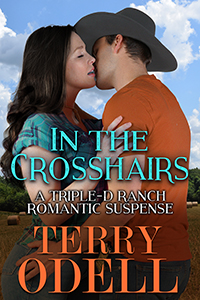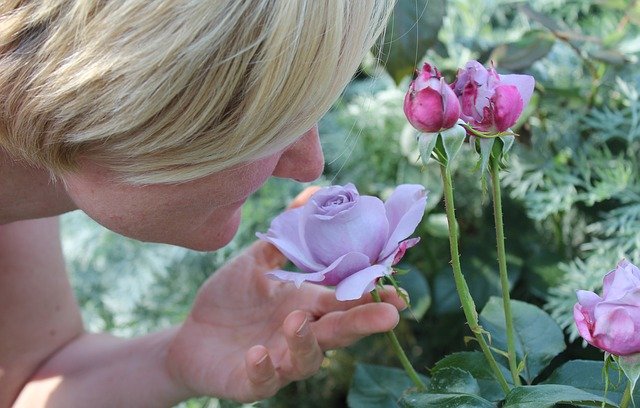The Nose Knows
Terry Odell
When we learned to write (and it’s an ongoing process, so I shouldn’t be using the past tense), we were told to pay attention to using the senses. Most of us focus on sight and sound, but there’s another sense that can bring additional life to your writing–the sense of smell. Sure, we might mention it if a character walks into a restaurant, or stumbles on a dead body, but otherwise, it’s frequently left out of our writing, or not utilized except in passing. Elaine did an excellent post about this several years ago, with excellent examples, but I thought the subject would be worth another visit.
Why is the sense of smell important? First, it’s another way for readers to connect to our characters. It’s also one of our most powerful senses. A brief detour into basic biology. I’ll spare you a lot of the technical talk, and cut right to the chase. If you’d like to delve deeper into the physiology, I’ll leave links at the end of this post.
The part of our brain that processes olfactory stimuli (smells) is closely connected to both memory and emotional centers. The other senses, like sight and sound, make a stop at the thalamus, which is the main relay station for the brain. From there, they go on to their processing centers. Not so the sense of smell. Scents go straight to the olfactory bulb, the brain’s smell center. This center is directly connected to the amygdala, the center for emotions, and the hippocampus, which plays a major role in memory. No, there’s not going to be a test, but this explains why a smell can trigger a detailed memory or a powerful emotion.
Okay, so there’s scientific documentation that smells are linked to memories and emotions. Any writing connections? Marcel Proust explored the phenomenon in Swann’s Way, wherein his character is transported to his childhood after savoring a madeleine cake soaked in tea. These memory/odor connections are referred to as the “Proust Phenomenon”—the ability of odors to cue autobiographical memories.
Many of us could stand to do more with the sense of smell in our writing.
Characters should not only be noticing smells, but they should be reacting to them as well. Detecting an odor could mean danger. Smoke waking them up at night. Food that doesn’t smell ‘right.’ A character’s scent memories can be a way to introduce back story, or move the plot forward.
A reminder, too, that sensory details shouldn’t be used like a laundry list. They need to mean something.
While I don’t pretend to have any remote similarities to Proust, I do try to include the sense of smell in my writing. They’re not deep, or ‘beautiful prose’, but they add to characterization, or move the story along.
Show, don’t tell, so here are a few examples from my own work.
From Finding Sarah, when the inevitable romance plot ‘black moment’ has separated Randy from Sarah. Throughout the book, he’s noticed the scent of her peach shampoo.
Randy spent the next few days wallowing in his own misery. Feeling like a first-class idiot, he’d even gone to Thriftway and bought a quart of Peach Blossom shampoo, only to pour it down the drain after using it once.
From Nowhere to Hide. We get a hint of the kind of taste Graham has from this snip:
Deputy Graham Harrigan sat at his computer in the Sheriff’s Office substation, the normal sounds of office activity fading to white noise as he hunted and pecked his way through the report he needed to file. As he’d told himself countless times, he should take a keyboarding class so he could get through the drudgery faster. The smell of stale, burnt coffee permeated the air, and he wished he’d taken a few minutes to stop at Starbucks.
And, from the same book, a look into Colleen’s past
Colleen jerked awake, drenched in sweat and tangled in the sheets. She sat up and fought the nausea as the memories came back, crystal clear and in freeze frame, like a slide show from hell.
A domestic dispute. By the book, she and Montoya using all the right phrases: “Yes, Mrs. Bradford. You don’t need the knife. Relax, Mr. Bradford. I’ll take the bat. Let’s sit down. Talk to me, Mr. Bradford.” The tension lifting.
Someone on the stairs. “You bastard! You’ll never hurt my mother again.” Kid, late teens at best. Brandishing a gun. Shooting. So much shooting. The noise. The smells. Gunpowder. Blood.
Our brains are wired to recognize unfamiliar smells. They also acclimate to prolonged exposure. My husband never noticed the smells he brought home after performing necropsies on marine mammals. One nick in his glove, and I knew it, but he was oblivious.
Check your current work for scent references. One way is to do a search on words such as odor, aroma, wafted, scent, smell.
Many of our scent memories relate to childhood because that’s when we experience them for the first time.
What scent memories do you have? For me, it’s the smell of birdseed. My great aunt and uncle had an egg ranch (which meant they raised chickens), and when we visited, we’d help feed the chickens. I’m transported back there every time we open a bag of birdseed.
My references for this post beyond my aging memory of physiology classes:
Why do smells trigger memories?
Here’s Why Smells Trigger Such Vivid Memories
Why Smells and Memories Are So Strongly Linked in Our Brains
What about your characters? How have you used the sense of smell to add depth or move the story? Examples welcome.
 Now available for pre-order. In the Crosshairs, Book 4 in my Triple-D Romantic Suspense series.
Now available for pre-order. In the Crosshairs, Book 4 in my Triple-D Romantic Suspense series.
Changing Your Life Won’t Make Things Easier
There’s more to ranch life than minding cattle. After his stint as an army Ranger, Frank Wembly loves the peaceful life as a cowboy. Financial advisor Kiera O’Leary sets off to pursue her dream of being a photographer until a car-meets-cow incident forces a shift in plans. Instead, she finds herself in the middle of a mystery, one with potentially deadly consequences.

Terry Odell is an award-winning author of Mystery and Romantic Suspense, although she prefers to think of them all as “Mysteries with Relationships.” Follow her on Facebook and Twitter.


Thanks, Terry. I really don’t use scent in my writing, though I should. The reflexive use of scent in most of what I read is when someone finds a body. I should probably broaden my interests. As for memories, that’s easy. Christmas Eve dinners at my Italian grandmother’s house, what with lasagna, fish, ham, and a host of other scents. I try to duplicate it every year, hoping my own children and grandchild will have their own memories. I think I’ve done it and it’s worth the effort.
Maybe now your characters might notice something other than a dead body, Joe.
Holiday dinners bring back those memories. Kudos for continuing the tradition.
I try to use all five of the POV character’s physical senses and at least one emotional sense (joy, dread, whatever) in every major scene. It’s a good rule of thumb. Just be sure to filter every word through the POV character, not the writer.
Good for you, Harvey. And yes, they have to be what the character experiences, not the author’s “Oh, I’d better thrown in a sensory detail here.”
Terry, your husband’s work aroma transported me back to a high school physiology class where we dissected a dead cat. The class was at 8 a.m. first period, meaning I spent the rest of the school day with Eau de Formaldehyde clinging to me.
Your post also triggered a place in my WIP where I can add smells to deepen a pivotal scene.
A prime rib is roasting for a family celebration that abruptly goes bad when an unwanted “guest” arrives. Following the intrusion, main character Tawny uses a bleachy smelling cleaner on carpet stains, a metaphor for the emotional mess the “guest” created.
Thanks, Terry!
We never dissected anything bigger than a rat in high school, but yes, the smell of formalin clings.
Your metaphoric use of the sense of smell (along with the actual smell) sounds perfect. Glad I triggered the inclusion.
I so strongly believe in using the five senses that I keep a little yellow sticky note at the side of my screen that says, in red letters, “SSSTF” – Sight Sound Smell Taste Feel. I make sure each sense goes in each scene, even if it’s just a smidge. Good post, Terry!
Thanks, Garry. The sense of smell is physiologically “different” enough from the others, and often neglected, so I thought it deserved its own post. But yes, we need to include all the senses as long as it’s the from the character’s POV.
Thanks, Terry. Great reminder to use all the senses in description. And a good review of neurophysiology and smell. Thanks for the links.
It is amazing how a scent from the past can transport us back immediately, and even allow us to remember the situation. I need to remember to use this to link to backstory.
I’ve failed to use the sense of smell enough, using it mainly to describe kitchen scenes. As for personal scent memories, different woods create different smells when they are cut or machined, reminding me of previous projects made with that species of wood. I wish I could remember people’s names as easily.
Thanks for a great post! And have a great day!
Thanks, Steve … I wonder if I could distinguish different wood smells. Seems to me that’s the result of experience, which would make for great character reveals. Once you start thinking in terms of the sense of smell, you’ll find more places to use them in your writing.
Excellent reminder, Terry. To answer your question: Hospital disinfectant, saltwater taffy, and Old Spice transport me back to my childhood. Love two, the other makes me nauseous. You can probably guess which one. 😉
Thanks for sharing, Sue, and I think I can guess. 🙂
This is a good topic, Terry, and I like your examples. My wonderful writing group has helped me over the past couple of years to get better with scents. In my “The Hay Bale” novelette, I wanted to drive home the Southern summer setting and described the aroma of magnolia blooms as honey drizzled over fresh lemon slices.
We had a magnolia tree in our front yard when I was growing up. I like your description of the fragrance. In the current wip, my character notices the scent of his Nonna’s gardenia dusting powder, but I didn’t go beyond gardenias. Might want to kick it up a tad.
Magnolias around here (Piedmont North Carolina) bloom in late spring, not summer, with the exception of the tulip magnolia which blooms a bit earlier.
Yeah, it was June in my story, sorta late spring, sorta summer. We have an ornamental magnolia that blooms early fall through the end of December. Strange, little tree.
Science fiction and fantasy Grand Master Poul Anderson said that we should have at least three senses used in each scene to make it come alive. That’s a great rule of thumb. It definitely hits the immediacy button for most readers.
After I read this, I walked through the house to get a late breakfast. Winter Storm Izzy has left behind sleet which has turned into a giant block of ice and high winds. I realized I was listening far more than looking or smelling because the sound of breaking and falling large trees and the wind would be my first warning of outside danger. So, sometimes, in a scene, we need to prioritize one of the senses.
Exactly, Marilynn. If you run through a checklist in every scene, readers will probably get bored. Choose the sense that makes the most sense. 🙂
A few of my favorite aromatic memories are the musty smell of books in the library, my Aunt Frankie’s German chocolate cake, and the salty air at the beach.
It’s interesting that the hippocampus is also considered central to creativity. Maybe that steaming cup of Peet’s French Roast sitting beside my keyboard is helping me think. (But all those years in an office with that awful smell of office coffee was probably inhibiting!)
JGuenther has done some research that touches on this area. I hope he weighs in on this conversation.
Thanks for chiming in, Kay. The brain is an amazing thing, isn’t it?
Hahaha! How could I not?
Good learnin’ goin’ on here this morning! Thanks, Terry.
I haven’t done much with this sense yet in my writing…need to up my game for sure.
The odor I immediately thought of (for myself) was urine. *Sorry*
The reason is that it reminds me of going to visit my mom in the nursing home during the two years before she passed away. It’s kind of bittersweet, in that I always remember her smile when she saw me coming down the hall, but the hatred of the smell that seemed to permeate the wallboards, floor, and drapes.
Nothing says that odors have to be pleasant ones. There’s a good conflict of memories going on in your example. (Conflict being a more “writerly” term than “bittersweet.) 🙂
Thanks for sharing.
Hi Deb, I totally get how an unpleasant odor can have some pleasant memories. Vinyl is that way for me. My dad’s car from the 1970s with those plastic seats that stuck to my legs, the nursing home where I visited an older friend (vinyl wasn’t a nice upholstery, but it was easy for the staff to keep clean), and stuff like that.
I love using scents, Terry! I had a discussion (read: polite disagreement) with my editor when I wrote about the smell of hot dust in a dooryard (there’s a word you don’t see often). She was a NY Fashionista, and said dust doesn’t smell.
I invited her to Texas…
I won.
Thanks, Laura. She could come up here to my mountain in Divide! I can see that in a scene, though. “What’s that smell?” “It’s the dust.” “How can dust smell?” “Welcome to Texas.” 🙂
1. I’ll definitely make a pass through “Tenirax” to check for odors! Thank you, Terry
2. I remember smelling Reno when we stayed there in 1946. It all smelled like dirt/dust.
3. What scent memories do I have? When I hit that sentence, I immediately thought of my aunt & uncle’s little ranch near Zelzah and the chicken feed they used. Then I saw your mention of an aunt & uncle’s ranch, and thought, “Oh, my! What a coincidence?” Or did my eyes skip ahead and jog my Guardienne’s memory, first, triggered by “egg ranch”?
4. Other scents I particularly recall: developer solution! cassia, hydrogen sulfide, pyridine, tertiary amines, mercaptans, ammonia, tertiary amyl alcohol. I served on an odor panel at Union Carbide detecting trace chemicals in ethanol product.
5. Yes, sense of smell is very different. Sight and hearing can be accessed by your emergency alert system before they reach the forebrain. Your Guardienne can sometimes alter those signals and suppress them, or store the memory where you can’t access it. Psychological “denial” is an autonomic process. More than a few times an old memory has acquired a new significance, one quite different than it had before. Sometimes, two memories will be put together, revealing something shocking that I might not have been able to accept or deal with at the time. I don’t think that applies to odors.
6. “Our brains are wired to recognize unfamiliar smells.” Yes, and they’re wired to recognize unfamiliar anything! When you walk into a room, say, it will be scanned for threats by the Guardienne, first. It stores a memory of the place and tags it safe. Meanwhile the image is still working its way forward from the visual cortex to the frontal cortex, where your intellect, at last, sees the place. You automatically try to store what you see in memory, and Odds fish! It’s already there! It seems like you’ve been there before. Deja vu.
Thanks for all of this, JGuenther. And you reminded me of darkroom smells! Thanks. The magic of watching an image float up in the tray. Those were the days. Digital images don’t smell like anything.
My hands would smell like developer all day. It had a sweetness to it, almost like pickles. We get pixels, instead, now.
Acetic acid – vinegar.
Thanks for the shout-out, Terry, and for a first-rate post about smell and memory. I worked for many years at a newspaper and I love the smell of printer’s ink. I drink tea, but my husband’s morning coffee reminds me of my coffee-drinking grandparents — a good memory. The smell of gasoline makes me think of my dad filling up the car for family vacations. And cinnamon reminds me of my grandmother’s kitchen.
Thanks, Elaine. I love your scent memories. I remember driving with one of my mom’s cousins, and she loved the smell of tar and pulled closer to one of those ‘trailers’ with hot tar. I couldn’t stand the smell (and let her know, but she was driving, and I was a kid).
And now I’m going through my manuscript again looking for ways to add scent! Thank you–greart post.
Glad to help, Patricia.